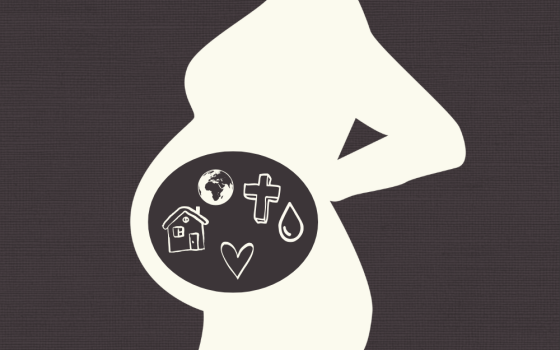
(Unsplash/Neal E. Johnson)

(GSR logo/Toni-Ann Ortiz)
Perhaps the most misunderstood of the three traditional vows religious women take, the vow of chastity often raises questions.
In their reflections this month, the panelists described how the modern interpretation of chastity contrasts with the old "renunciation" emphasis, explained how it reflects their particular congregational charism, and considered the gifts and opportunities it brings as they answered the question:
How does the vow of chastity/celibacy uniquely witness to society in your particular culture and with your particular age group?
______
 Kathryn Press is an Apostle of the Sacred Heart of Jesus from the U.S. state of Georgia. She professed her final vows in 2018. With a Master of Divinity and a background in religious studies, she has taught every grade from pre-K through high school. After opening a convent in Ireland, she taught in New York City for three years before returning to Ireland in September 2020 to work in evangelization and parish ministry.
Kathryn Press is an Apostle of the Sacred Heart of Jesus from the U.S. state of Georgia. She professed her final vows in 2018. With a Master of Divinity and a background in religious studies, she has taught every grade from pre-K through high school. After opening a convent in Ireland, she taught in New York City for three years before returning to Ireland in September 2020 to work in evangelization and parish ministry.
Valentine's Day decorations. You're thinking red roses, pink hearts, glitter, confetti, maybe streamers, too. In our convent, we decorate nicely in February, but June is when we really go all out.
June is traditionally the month dedicated to the Sacred Heart of Jesus. It's time to repurpose those decorations. My students laughed when I adorned our classroom with hearts at the end of the school year, even giving them valentines from Jesus. If we celebrate love in February, why not celebrate it also in June? Every day is a reminder of Jesus' love for me! And each day holds endless opportunities to share that love with the people around me.
Love. The word punctuates the prayers of my day, beginning with the morning offering and professing to Jesus that I be "a witness to your love." My sisters and I continue by entrusting to the Sacred Heart of Jesus "the works to which we dedicate ourselves for your love." In the evening, when we gather, we pray "that we may learn to recognize you and serve you with attentive love in the wounded members of your body." Love in being. Love in doing. An ebbing and flowing of love, all for him who is Love.
As Apostles of the Sacred Heart of Jesus, the words of our vow formula, the public proclamation of who we are and how we live, read: "I vow to God chastity, poverty and obedience." Living a vow of chastity, I proclaim, however imperfectly, a different source for my motivation and strength captured in our congregational motto: Caritas Christi Urget Nos (2 Corinthians 5:14). The love of Christ impels us.
Knowing Jesus' love for me compels, urges, motivates, encourages, prompts me to share that love with others. I must! My whole being yearns to share this love with others, not with a husband and a family, but to anyone and everyone I meet — in the classroom, in the pew, in the supermarket, in traffic, in a Zoom meeting, in the comments on a Facebook post, in the convent kitchen.
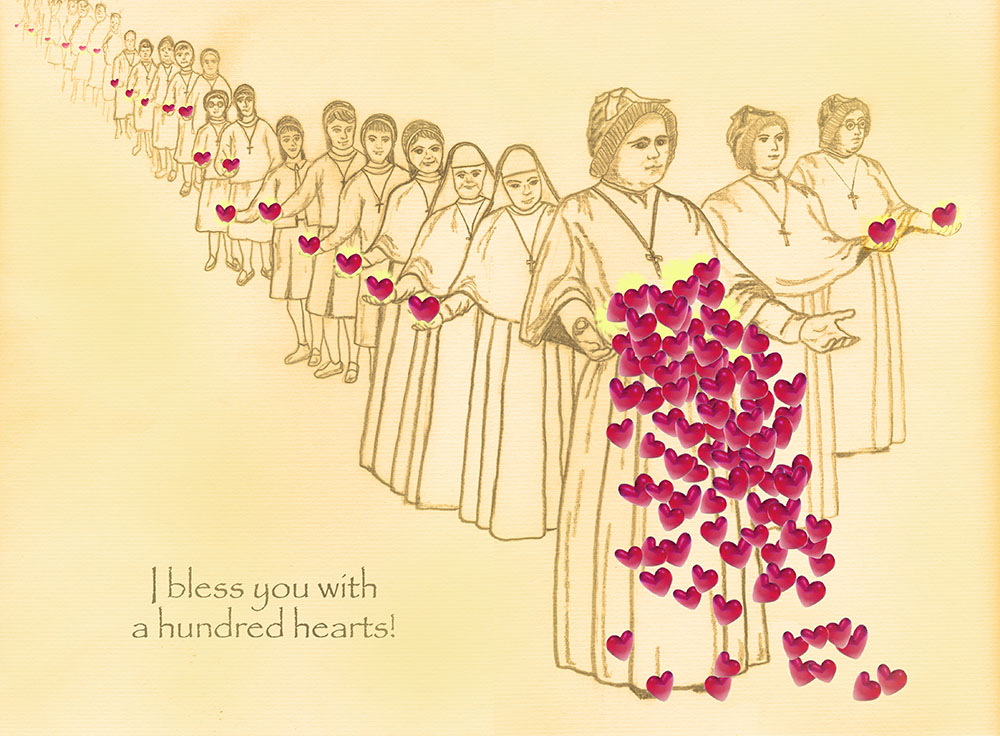
"I Bless You With a Hundred Hearts" by artist Sr. Doretta D'Albero of the Apostles of the Sacred Heart of Jesus (Courtesy of Apostles of the Sacred Heart of Jesus)
Our foundress, Blessed Clelia Merloni, had a tender way of closing her letters: "I bless you with a hundred hearts." It was her way of telling her daughters how much she loved them, that the distance between Italy and a faraway missionary land could be easily bridged by her love. It was a confident proclamation of faith that our small offering to Jesus will be returned a hundredfold.
This is the vow of chastity to me: to love with a hundred hearts. I look to Jesus' Sacred Heart, burning with love for me, and whisper my own prayer each day: "Not as I love, help me to love as you love. Only love in a fallen world. Only and always to stand in the breach. Only to build up. Only to bear fruit. Only in your Heart can I do this. Amen."
How can you love with a hundred hearts today?
 Dr. Beena Madhavath is from India, a member of the Congregation of Ursulines of Mary Immaculate. Her medical degree is in obstetrics and gynecology, and she has served as the medical superintendent, deputy director, consultant gynecologist and teacher at Holy Family Hospital in Mumbai, India. She is the provincial councilor for medical apostolate of her province, the national president of the Sister Doctors Forum of India, and a board member of the Catholic Bishops' Conference of India-Coalition for AIDS and Related Diseases and India's Christian Coalition for Health.
Dr. Beena Madhavath is from India, a member of the Congregation of Ursulines of Mary Immaculate. Her medical degree is in obstetrics and gynecology, and she has served as the medical superintendent, deputy director, consultant gynecologist and teacher at Holy Family Hospital in Mumbai, India. She is the provincial councilor for medical apostolate of her province, the national president of the Sister Doctors Forum of India, and a board member of the Catholic Bishops' Conference of India-Coalition for AIDS and Related Diseases and India's Christian Coalition for Health.
In our country, the vow of chastity or celibacy is a unique witness to society. In a country like India, where we live in the context of multicultural and religious pluralism, it seems to me that consecrated people who have pronounced the vow of chastity are esteemed and respected by all strata of society.
Even in this present age of modernization and sexual liberalization, most people in our country consider consecrated chastity as something special, divine and saintly. I am personally convinced that there is an immense joy in living the vow of chastity and the beautiful purpose that it serves. We become credible witnesses as religious by living our consecrated chastity authentically. Indian society perceives it as a symbol of our core commitment to God and his people.
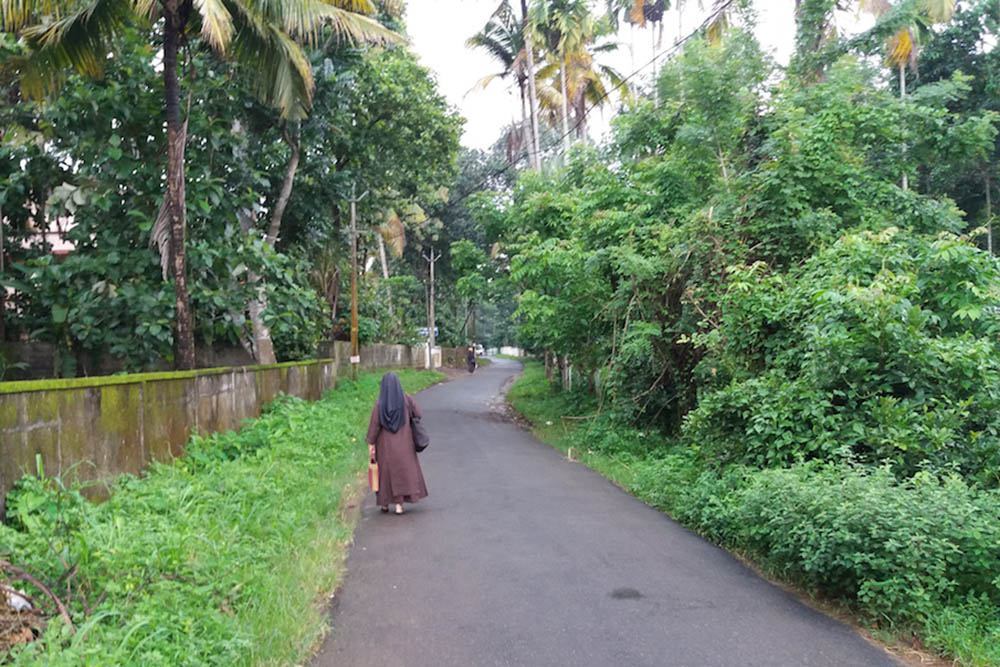
A Carmelite sister walks a country road during a Gospel Journey Campaign in Kerala, southern India, in 2019. (Philip Mathew)
The deepest reason for a life of chastity is the unconditional nature of the love of God. It is only when we are gripped by this fullness of love that we are drawn to choose the vow of chastity.
Through the vow of chastity, each of us strives to imitate Jesus, who himself was chaste (Matthew 19:12). It is primarily a call of love and a response to enter into a friendship with Jesus.
Indeed, consecrated chastity is a way of life for me — a gift, a charism that is given by the Holy Spirit to a few chosen people. With an undivided heart filled with passion for Christ and compassion for humanity, consecrated chastity empowers me to embrace the larger human family with a sense of detachment and purity of intention. Thus, the vow of chastity is a commitment to love unconditionally and serve without counting the cost.
Consecrated chastity enables me to derive a special spiritual strength, fruitfulness in ministry, and more apostolic availability toward all people. A love that is not limited to a single person and family and instead is freely offered to all, especially to the poor and the marginalized, has a powerful witnessing value to attract and lead people to Christ. It sends the message that God and the kingdom of God are active and alive in our midst even today.
Therefore, those who live a life of chastity have tremendous witness value and influence among families and society in a country like India, where Christians constitute only about 2.3% of the population.
 Susan Elizabeth Smith, a Sister of Our Lady of the Missions from New Zealand, has worked in education at various levels: primary and secondary school teaching in New Zealand, university education in New Zealand and Australia, and with Duquesne University in Rome and Manila, Philippines. She has been involved in pastoral and catechetical formation in Papua New Guinea; in adult literacy and numeracy programs for Maori in New Zealand; in congregational formation programs in Davao City, Philippines, and St. Rambert, France. Currently, she volunteers as a budget adviser, helps with an emergency housing trust and some environmental groups, and writes for publications.
Susan Elizabeth Smith, a Sister of Our Lady of the Missions from New Zealand, has worked in education at various levels: primary and secondary school teaching in New Zealand, university education in New Zealand and Australia, and with Duquesne University in Rome and Manila, Philippines. She has been involved in pastoral and catechetical formation in Papua New Guinea; in adult literacy and numeracy programs for Maori in New Zealand; in congregational formation programs in Davao City, Philippines, and St. Rambert, France. Currently, she volunteers as a budget adviser, helps with an emergency housing trust and some environmental groups, and writes for publications.
"Worldly and profane songs, much more reprehensible from the lips of one consecrated to God" and "holdings of the hands and other signs of sensual affection" are always seriously sinful.
So I learned by heart before I made my first profession in 1961!
There is little doubt that at that time, our understanding of the three vows of poverty, chastity and obedience were driven by those sin-laden theologies that dominated the Catholic mindset prior to the Second Vatican Council. The vows were, above all, renunciatory: no possessions, no sex, no voice.
One of the great insights of the council was its invitation to move beyond dualistic theologies to those that were more holistic and that encouraged us to see that all God created was good, including our bodies. No longer were they a potential or real source of sin. Instead, it was through our bodies that we could enflesh the love of God in our daily lives and ministries.
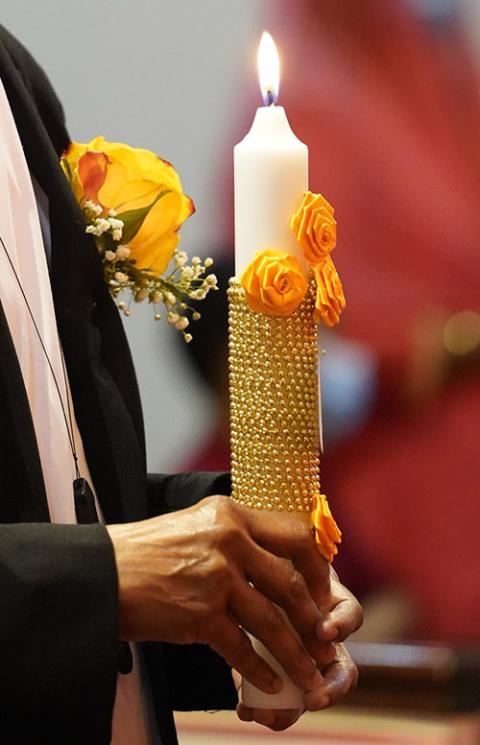
A Sister of the Imitation of Christ holds a candle during a liturgy in New York state in May, when she marked her golden jubilee as a religious. (CNS/Gregory A. Shemitz)
By 1970, many religious missionary women had said farewell to a semi-enclosed way of life with its monitored visits to the parlor, and instead, we sought to immerse ourselves in the world in which we lived. Our lifestyles changed dramatically, and the possibility for real friendship with other women and men was there.
Our chastity was not simply about renunciation, but about reaching out in love to others. How this reaching-out was to be exercised was increasingly the responsibility of the individual sister. Occasionally, friendships developed in directions not envisaged by either those involved or those who observed and so could be a source of concern. But more often, that did not happen, and more inclusive ways of loving became the norm for many religious women.
Today, almost 60 years after first profession, there are three points about our vow of chastity that I see as especially important.
First, we live at a time in the Western world when so-called "love" often seems to collapse into sexual activity. We older religious — by far the largest demographic of religious in the West — can witness to a love that is not centered only on "the other," but to a way of loving that is more inclusive. I think that when people see nonsexual love in action, it causes them to pause and ask themselves what really does constitute love in our sex-drenched world today.
Second, Australian Mercy Sr. Janette Gray's book Neither Escaping Nor Exploiting Sex: Women's Celibacy suggests that given the ever-increasing pressure on natural resources in our world today, freely choosing not to have children can become an important way of being proactive about care of Mother Earth.
Finally, I imagine that most women's congregations today include care of the environment as a mission priority. We are reminded time and time again that we are not superior to or better than the rest of creation, as earlier sin-laden theologies mandated. Rather, we are encouraged to recognize our oneness with all creation and our need to enter into loving relationships of mutuality and interconnectedness with all that God has created.
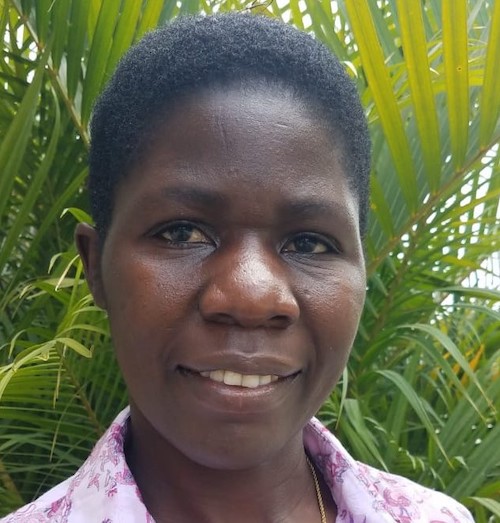 Margaret Grace Nakafu of Uganda is a member of the Medical Missionaries of Mary. With an academic background in sustainable human development as well as HIV counseling and computer science, she has lived and worked in six countries: Uganda, Rwanda, Kenya, Tanzania, Ireland and Honduras. Currently, she ministers in Honduras, doing parish pastoral work, advocating for youth, vulnerable families and the elderly.
Margaret Grace Nakafu of Uganda is a member of the Medical Missionaries of Mary. With an academic background in sustainable human development as well as HIV counseling and computer science, she has lived and worked in six countries: Uganda, Rwanda, Kenya, Tanzania, Ireland and Honduras. Currently, she ministers in Honduras, doing parish pastoral work, advocating for youth, vulnerable families and the elderly.
In today's world, xenophobia, discrimination, apathy, intolerance and racism of all kinds affect how people live and interact with one another. This creates a culture of dualism and indifference. The vow of celibacy offers opportunities for countercultural experiences of respectful and dignifying encounters. As a vow of unconditional love, it generates the vital energy that helps us to reach out to others in faith and goodwill.
The vow of celibacy, a real gift from God, touches me holistically. As I live this vow, I have experienced a universal love for all people, living and interacting freely with people of all ages, cultural backgrounds and social status.

(Unsplash/Tyler Nix)
Experience has taught me that human beings grow and bloom within an environment of mutuality and intimate relationships. Close relationships, both a gift and a challenge, are essential in the life of religious men and women in order to become a more loving and integrated person. In today's culture, it takes tremendous personal conviction to live a celibate life in accordance with the Gospel values of truth, genuineness, authenticity, fidelity and love.
I have heard many times that today's young people fear and hesitate to make life commitments. Pope Francis talks of a culture of discarding. With advances in technology and social media, making and maintaining meaningful relationships are becoming a challenge.
By living the vow of celibacy, we can witness how to reach out to each other — creating atmospheres of acceptance, affection and warmth, with expressions of love and tenderness — and show that we appreciate mutually supportive relationships.
As I reflected on this, I asked my friends for their point of view. This was a little risky, since I did not know what feedback to expect. I thought that my living this vow did have a significant impact on society, and my friends surprised me with profound responses, expressing appreciation for how our encounters have been enriched by the ways my life expresses the gifts of celibacy.
The vow of celibacy is a witness that young adults have a great capacity to love people of different races and sexes; that both men and women have the freedom to have authentic, mutual relationships and share the joys and sorrows of life. It is a witness that a person can be fully and authentically productive beyond cultural barriers and without the expression of genital intimacy.
Advertisement
Celibacy gives a deeper meaning to "productivity" as a choice to make and maintain circles of friends who make meaningful connections in realizing both individual and group goals. These friends are a supportive resource throughout the different stages of life. They give us shoulders to lean on, affirm our growth, encourage our efforts, open our eyes to our hidden giftedness, and challenge us to take the next step when we prefer to run away.
It is a witness to the value of fidelity that involves tremendous perseverance, prayer, commitment, honest communication and mutual support within a circle of friends. This fidelity is only possible for mature people. Though demanding, it witnesses that love is the most powerful force that moves and nourishes the world.
Celibacy affirms that women have a right to live an independent life and the freedom to make choices that are life-giving to them and to society, even when the popular culture may be promoting the contrary. It is a witness to the many other ways women can enhance life by engaging our sexual energy into forming and maintaining healthy relationships, showing love and concern to those on the margins of life and making them feel worthwhile, empowering others to rise up and claim their rights, learning to take personal responsibility, and building one's self-esteem.
Therefore, as a young consecrated religious, I am convinced that taking this vow has helped me to realize the inner potential that I have to relate freely with others, creating bonds of mutuality, interconnectedness and respect — with God's grace giving countercultural witness.




